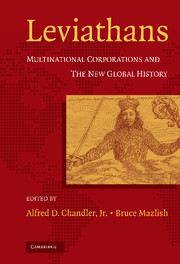Introduction
Published online by Cambridge University Press: 17 August 2009
Summary
This book and the project of which it is part were inspired by a United Nations statement a few years ago that of the 100 entities with the largest gross national product (GNP), about half were multinational corporations (MNCs). This meant that by this measure these big MNCs were larger and wealthier than about 120 to 130 nation-states. They still are. An atlas depicts continents and nation-states, their boundaries, their leading features, geographies, and geological characteristics such as mountains, rivers, and so forth. The MNCs do not exist on traditional maps. Convinced that these new Leviathans must be acknowledged, identified, and located, we produced Global Inc., an historical atlas that shows their outreach. This book, which is the atlas's conceptual counterpart, seeks to make MNCs more visible and more understandable to the mind's eye.
Thomas Hobbes' seventeenth-century book Leviathan tried to provide a metaphoric analysis of the notion of a commonwealth or state. The model he used to conceive his new body politic, its “Matter, Forme and Power,” was the automaton – an artificial creation, representing a physical body and a human mind and soul. Thus, he spoke of sovereignty as “an artificial soul,” and magistrates as “artificial joints.” In short, the state was the product of art – that is, artifice. Hobbes co-opted the term “leviathan” from a biblical allusion. Webster's New Collegiate Dictionary defines “leviathan” as, alternatively, a great sea monster (adversary of Yahweh); a large ocean-going ship; a vast bureaucracy; or something “large or formidable.”
- Type
- Chapter
- Information
- LeviathansMultinational Corporations and the New Global History, pp. 1 - 16Publisher: Cambridge University PressPrint publication year: 2005
- 5
- Cited by



